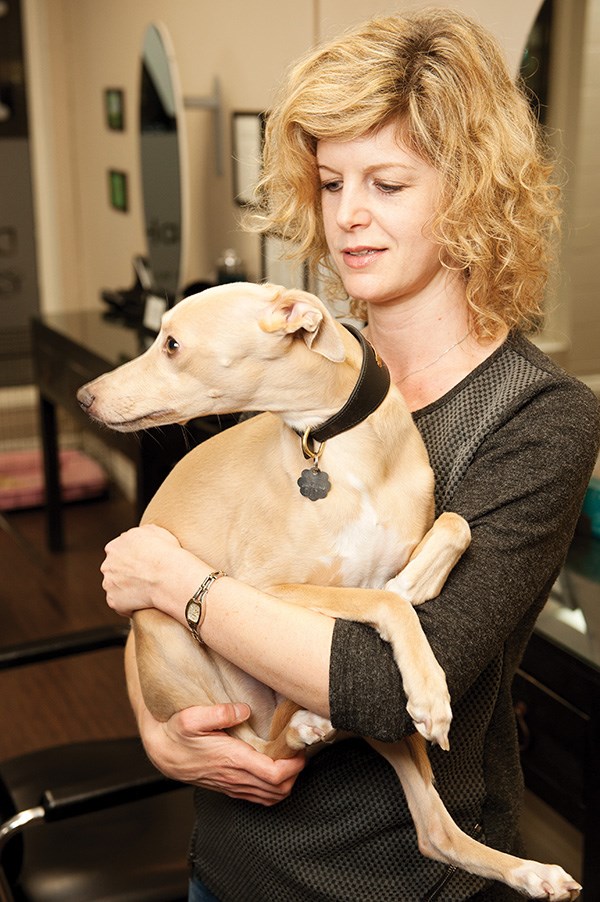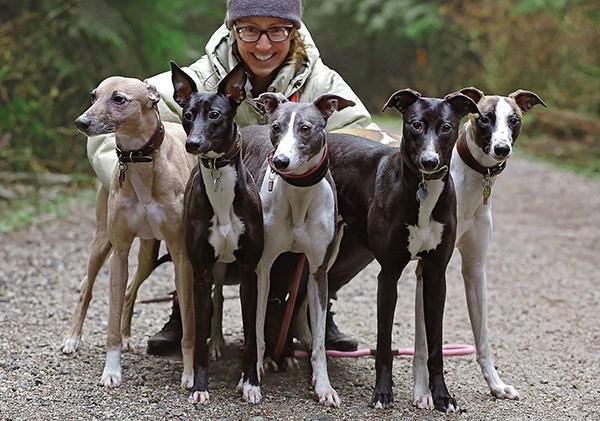Sprinting across their yard with gusto, Anakin, Merckx and Fuego are preparing for what they are bred to do.
The three whippets, smaller descendents of the greyhound, will be racing in an annual competition held at Brennan Park in Squamish this summer. About 30 dogs from Oregon, Washington and all over B.C. are expected to arrive with the North American Whippet Racing Association and the National Oval Track Racing Association. The medium-sized dogs can run 200 yards in about 10 to 12 seconds as they chase a piece of plastic to the finish line.
Darien Adley, owner of the three dogs, has been involved in Squamish racing since it began 15 years ago. Her youngest, Fuego, is 11 months old and will be racing in a special competition for puppies.
“They can start racing around 10 months, but most people wait until a year,” said Adley, whose other dogs, Merckx, named after Belgian cyclist Eddy Merckx, and Anakin, named in honour of the Star Wars character Anakin Skywalker, will also be competing.
”They have a natural prey drive and are happy to chase things. They have to be trained to load into start boxes and run with other dogs, a maximum of six.”
Typical of the whippet breed, Adley’s dogs are quiet and calm but spring into action when they are taken outside to sprint through the yard, then return to rest for the day.
“I was four when I had my first whippet. When it was time to get a dog of my own, this was the natural choice,” said Adley, whose mother has bred whippets since the early 1970s. Adley also does breeding – Merckx is Fuego’s dad.
Once dubbed the “poor man’s racehorse,” whippets have a high prey drive and are naturally competitive.
“People who wanted to bet and have some fun, but didn’t have much money, would get a whippet,” said Adley, who enjoys watching historical racing footage from the early 1900s.
Whippets were originally English greyhounds that were too small for stag hunting and, instead, were bred to hunt rabbits and other small prey by sight.
Race breeding began in England during the mid-19th century when the dogs were “trained to the rag” by encouraging them to run to their owners, who waved white rags in the distance.
Now, in B.C., more whippets race than greyhounds, which are typically faster but less agile.
The race in Squamish takes place annually, with nationals held every five years.
This year, a regular club meet starts on Saturday, Aug. 27, when competing whippets will run 200 yards in a straight line. Puppies will run a shorter course of 150 metres.
Then, on Sunday, the whippets will take part in the oval race, a 300-yard course run in a circle. Puppies sit out for this competition because it’s more physically demanding.
“Squamish is considered one of the best places to race in North America,” said Penny Wilmot, who has been involved with racing in Squamish since its inception and has owned whippets for 50 years. “The grounds are very well looked after.”
Last year, Squamish hosted the national races after severe fires forced a group in Southern California to cancel. With only a few months to plan, Squamish successfully hosted 70 whippets and their owners from California, Oregon, Washington, Alberta and B.C.

‘The perfect dog’
Malinda Evans’ two whippets curl up in their beds while she attends to customers at her salon, Divaz Hair Lounge, in downtown Squamish.
The mother-daughter pair – Lexy and Stella – sleep peacefully through the buzz of hairdryers and friendly chatter.
“I knew they could run fast, but I was amazed the first time I saw them run past me. You can hear the thundering as they get near you, like little miniature horses,” said Evans. “It’s great to see them do what they’re bred for.”
Even with all their energy, whippets are calm during the day, making them ideal pets for Evans, who brings them to work with her.
“They will chill with you. They are really easygoing.”
Evans also shows her dogs professionally and is thankful for their low-maintenance, short coat. She does, however, have to brush their teeth and trim their nails.
“They are solid-tempered, friendly dogs that make great bed dogs. They need to be trained,” said Wilmot.
Having originally owned a whippet-greyhound cross, Wilmot learned about the B.C. Whippet Racing Club when she saw a competition at Ambleside in West Vancouver. She ended up with 20 whippets over the years, usually owning around four at a time.
Whippets range in weight from 15 to 42 pounds, with the larger dogs typically bred in the United States and Canada because the American and Canadian kennel club standards are larger: 47 to 57 centimetres for males and 44 to 55 centimetres for females.
Unlike Adley’s whippets, Evans’ dogs aren’t race bred, meaning they are smaller in size and not quite as fast.
“They have a totally different look. They are smaller and don’t have as many muscles. I tried to keep the English-style whippet that’s more popular in Europe.”
Whippet owners look at the bloodline of the parents to determine which characteristics will likely be prominent, with each owner looking for different attributes.
Stella, for instance, has less racing in her bloodline than her mother, who is faster.
“They’ve raced against each other. I was worried at first but they just ignored each other,” said Evans.
Even though her dogs likely won’t finish in the top 10 because of their breeding, they still approach the competition with great zeal. They usually race in Abbotsford, but have travelled as far as Roy, Wash. in 2008.
“Whippets are a lot of fun because you can do so much with them,” said Evans.
“To me, they are the perfect dog.”




